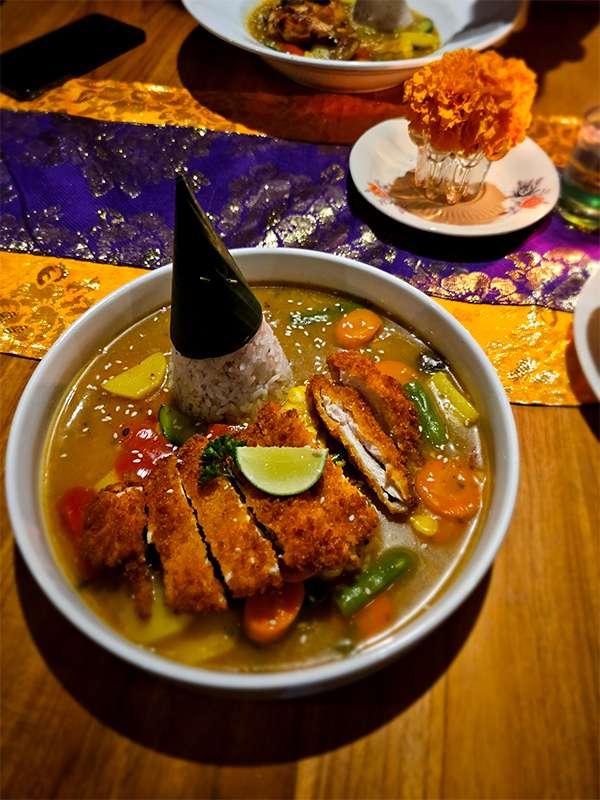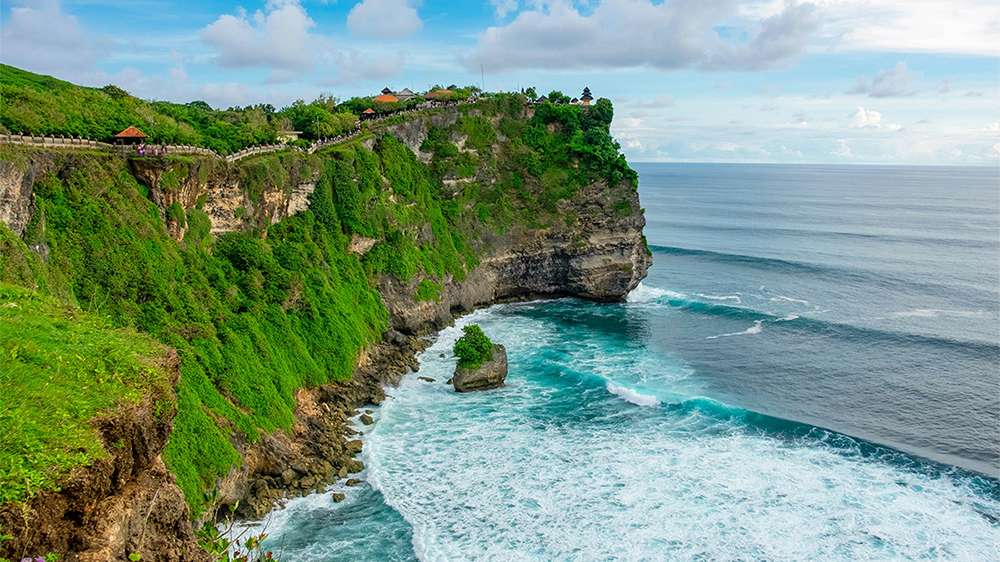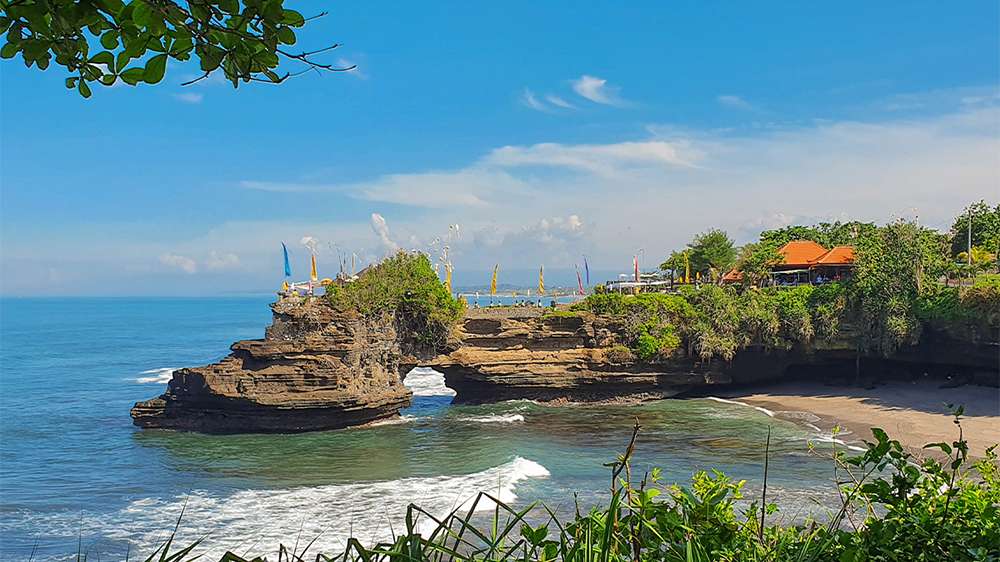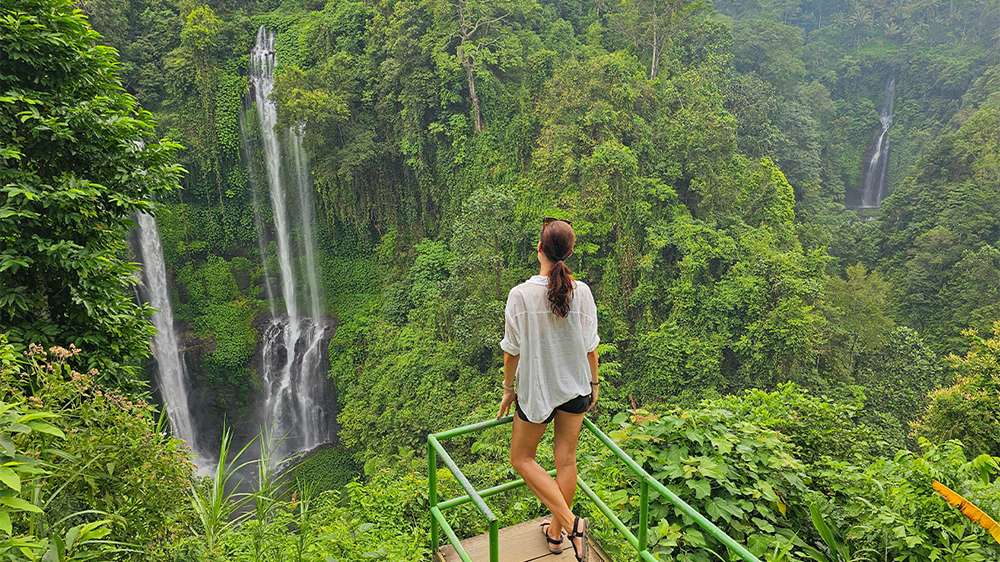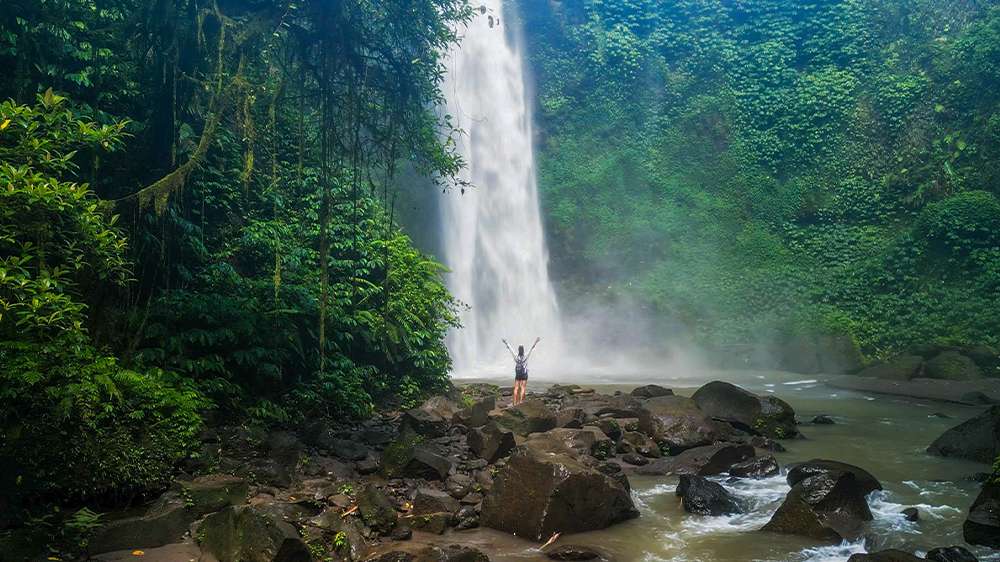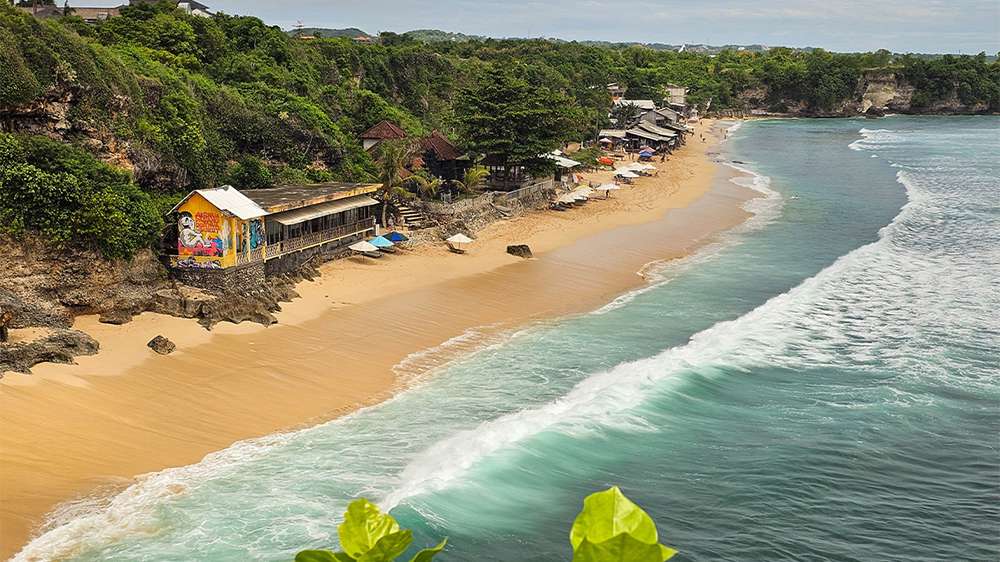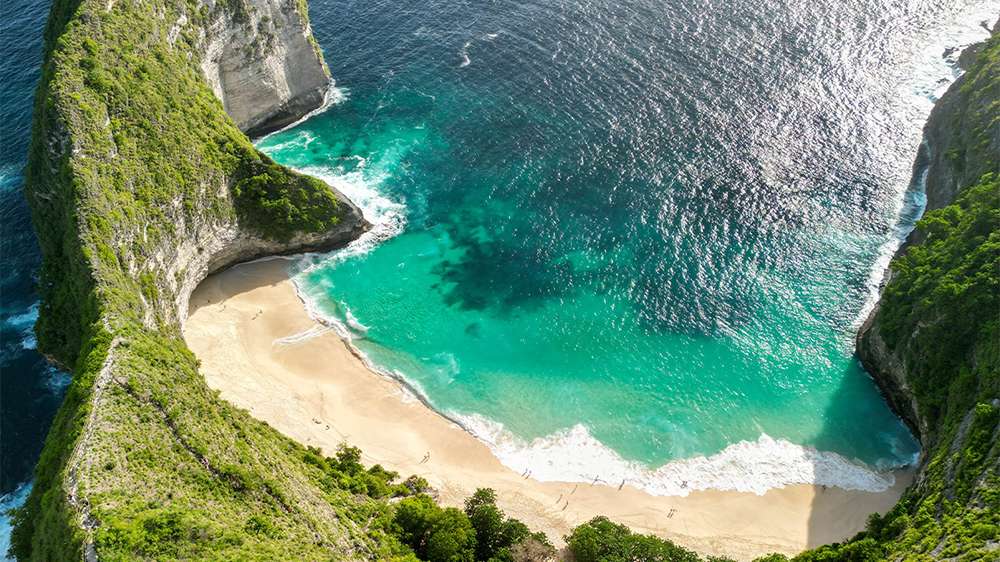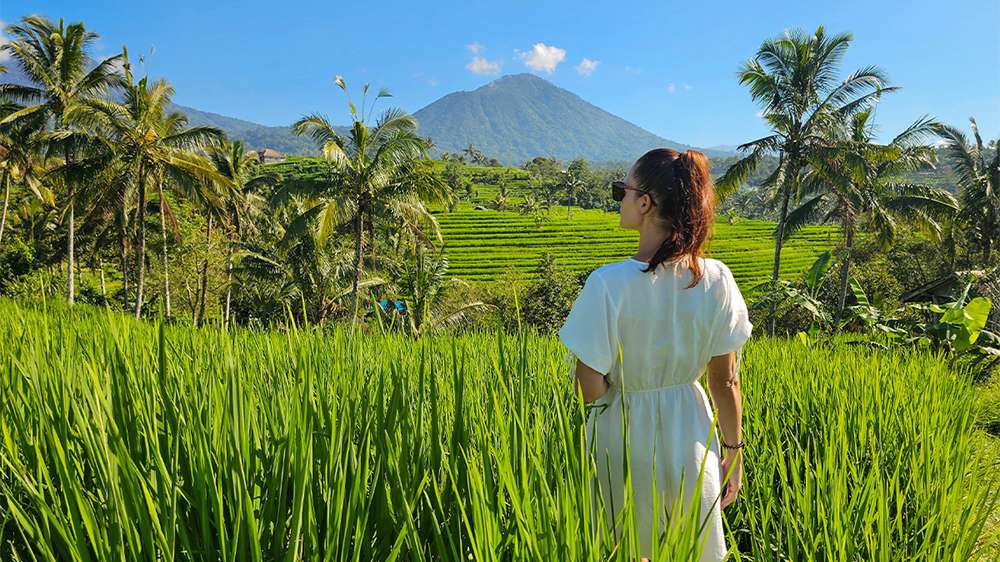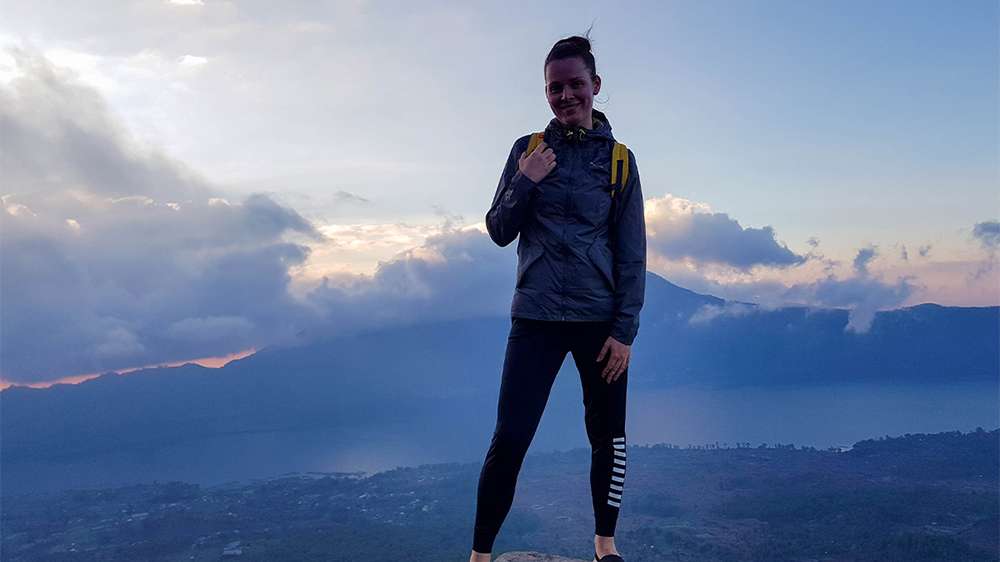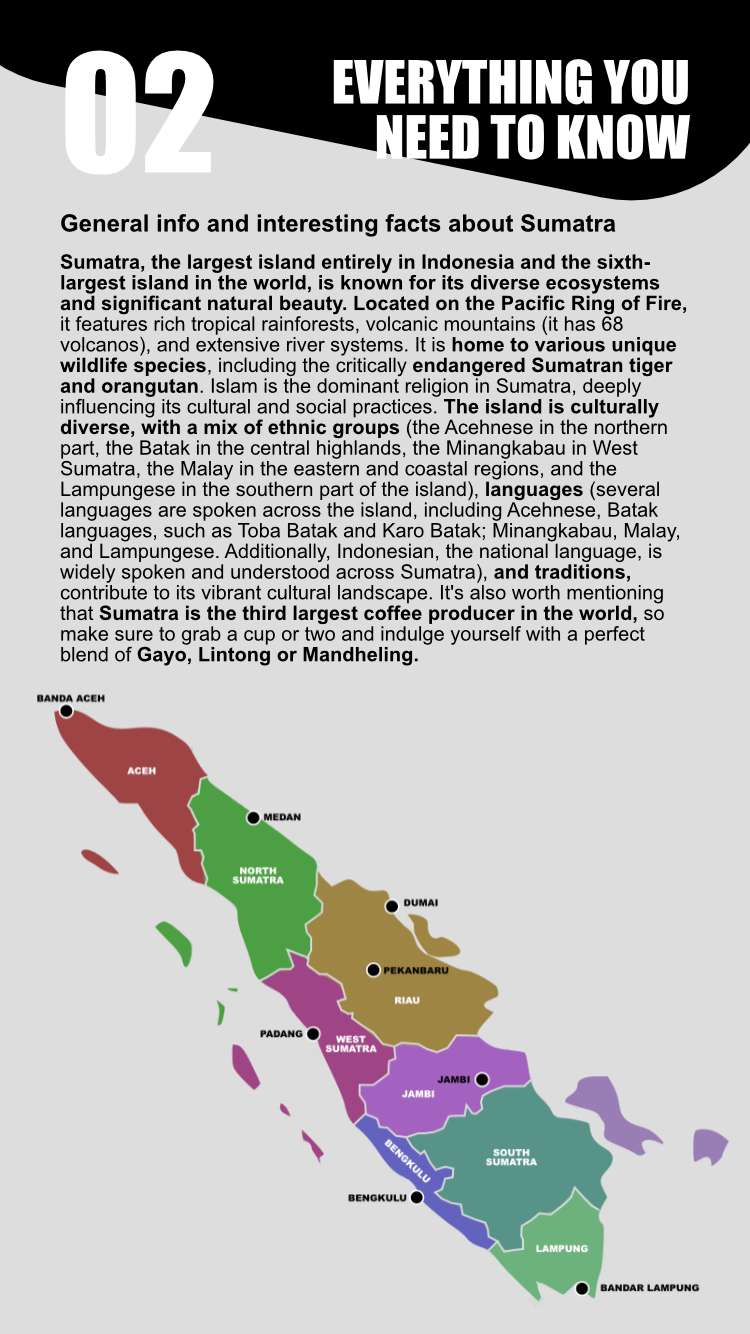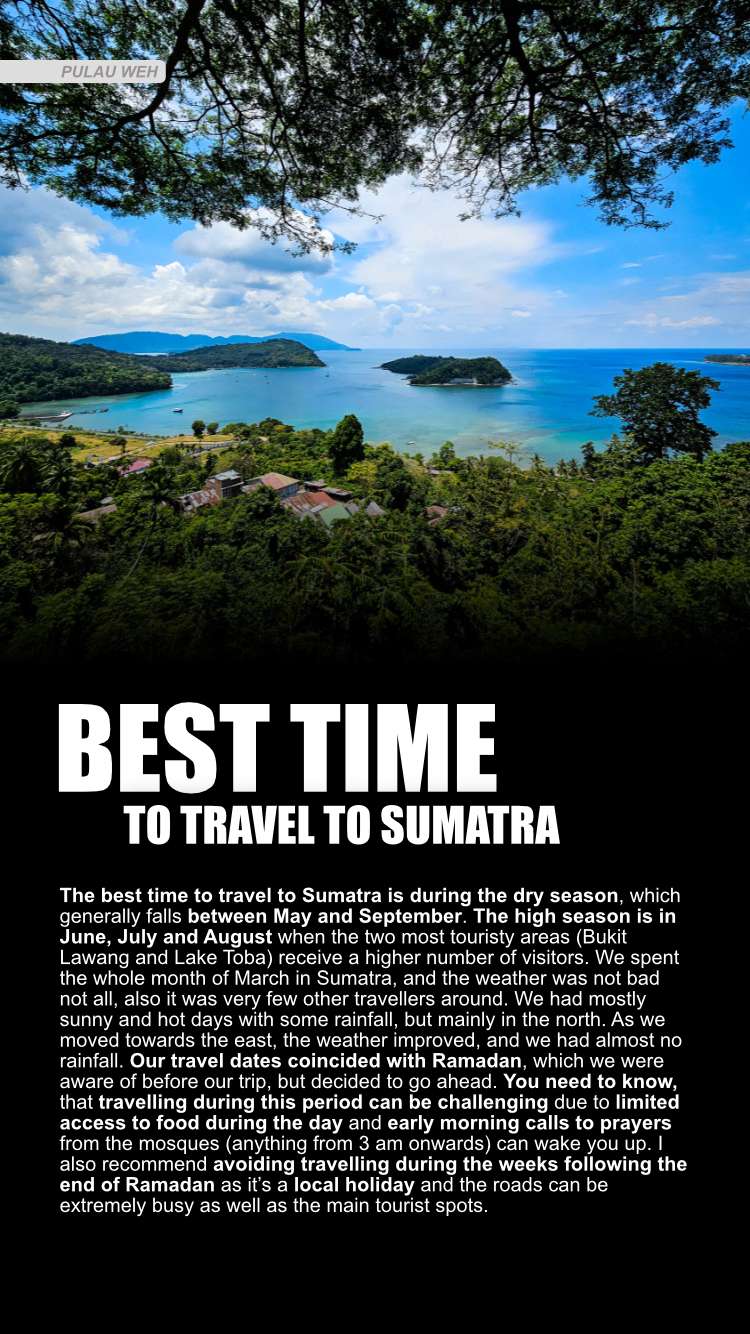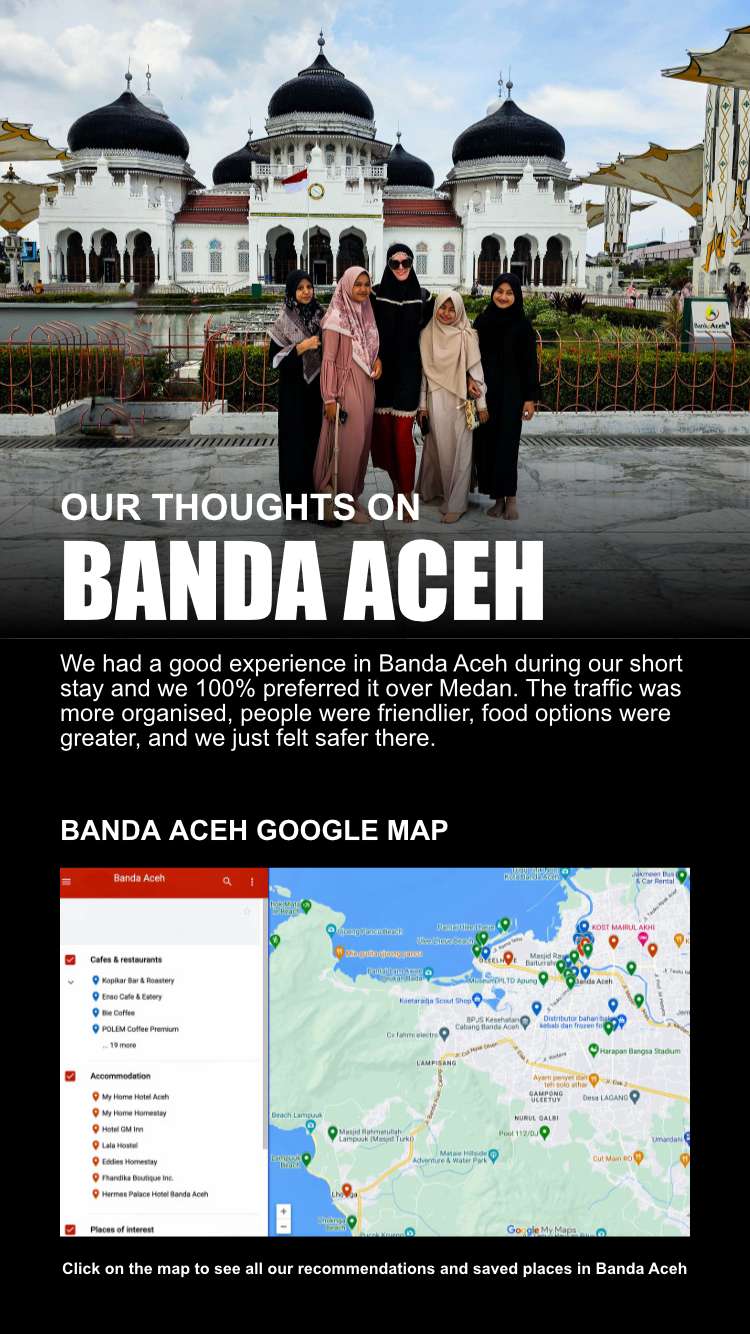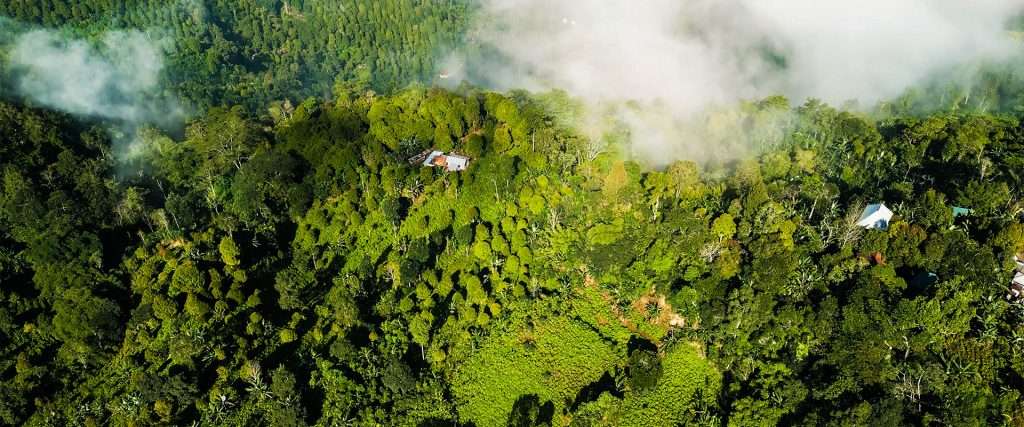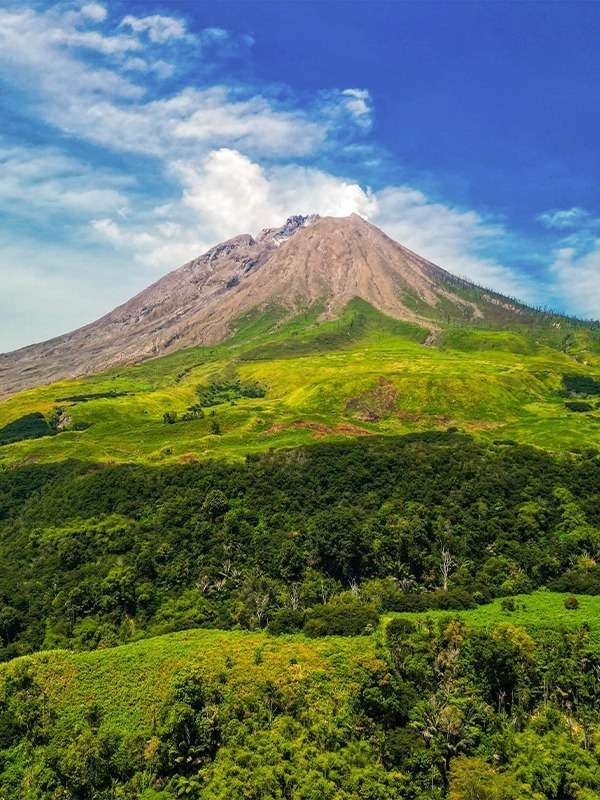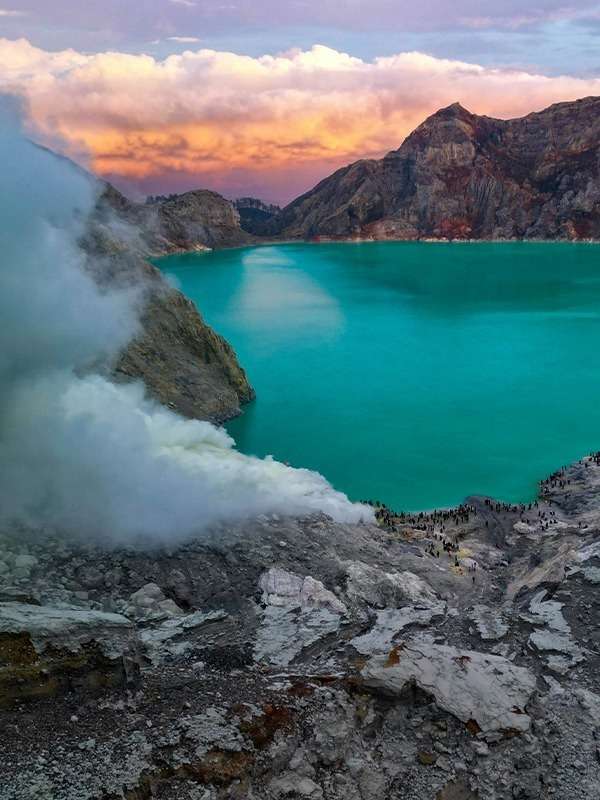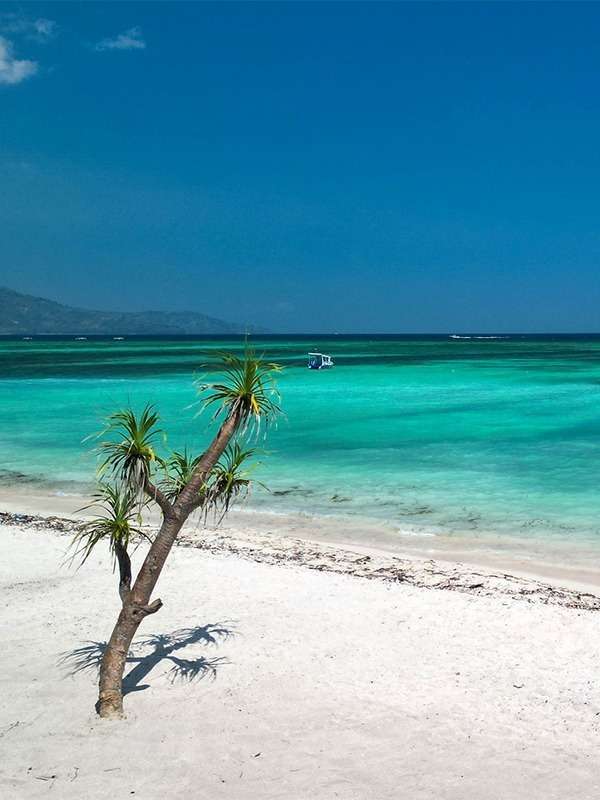Bali, Indonesia’s ‘Island of the Gods,’ is a tropical paradise full of stunning beaches, lush rice terraces, and rich culture. In this Bali Travel Guide, you’ll discover top things to do, hidden gems, and local experiences that will make your trip unforgettable. From sacred temples to breathtaking waterfalls, Bali has something for everyone.
During our 1.5-month adventure, we soaked up the sun on pristine beaches, explored off-the-beaten-path spots, and embraced the island’s authentic charm.
Ready to plan your dream Bali getaway? Dive into this guide for essential tips, must-see highlights, and unique experiences. Additionally, check out our Ultimate 3-Week Bali Itinerary to make the most of your time on the island!
Bali at a Glance: Key Facts and Travel Insights
Geography and Location of Bali
Bali, one of Southeast Asia’s most iconic islands, is part of Indonesia’s Lesser Sunda Islands. Located between Java and Lombok, it is known for its volcanic mountains, lush rice terraces, white sandy beaches, and dramatic coastlines. Despite its compact size, Bali offers an incredible variety of landscapes and attractions, making it a convenient and diverse destination for travellers.
Did you know?
Bali is also home to Kopi Luwak, one of the most expensive and unique coffees in the world. This coffee is made using beans that have passed through the digestive system of a civet cat, a process believed to enhance its flavour and reduce acidity. However, its production has sparked controversy due to animal welfare concerns. If you choose to try it, look for ethically sourced options to support sustainable practices.
Religion and Language in Bali
Bali stands out as Indonesia’s only Hindu-majority province, with approximately 86.9% of the population practising Balinese Hinduism.
This deeply spiritual belief system shapes the island’s culture, traditions, and daily life. Visitors will witness colourful ceremonies, daily offerings, and iconic temples like Uluwatu and Besakih, providing a glimpse into Bali’s rich spiritual heritage.
The official language of Bali is Indonesian, but most locals primarily speak Balinese in their daily lives. In tourist areas, English is widely spoken, making communication easier. However, learning a few basic phrases can enhance your experience and earn you the respect of locals.
Here are the most essential phrases to know
Hello | Greetings:
Selamat Pagi
Thank You:
Terima Kasih
Excuse me:
Permisi
Culture and Food in Bali
Bali’s culture is a vibrant mix of ancient traditions and spiritual practices, influenced by Hinduism and the island’s rich history. From the majestic temples to the colourful ceremonies, Bali’s culture is a celebration of life and devotion. During our time on the island, we were warmly welcomed by the locals, who shared their traditions and customs, making every moment even more special.
Bali’s cuisine is a delight for food lovers, with its bold flavours and fresh ingredients. Make sure to try iconic dishes like nasi goreng (fried rice), sate lilit (grilled skewers), babi guling (suckling pig), and ayam betutu (slow-cooked chicken). Exploring the island’s bustling street food markets is a fantastic way to sample a wide variety of dishes, making it a fun and delicious part of your Bali adventure.
Top Activities to Experience in Bali
From vibrant beaches to lush landscapes, Bali is filled with unforgettable experiences. In this Bali Travel Guide, we’ve compiled the top activities to help you make the most of your trip. Surf world-famous waves, hike stunning viewpoints, and immerse yourself in Bali’s rich culture. Adventure, nature, and culture await, so make sure these must-do activities are on your Bali itinerary.
Visit Cultural and Religious Sites
Bali’s vibrant culture is shaped by its Hindu traditions. Don’t miss iconic temples like Uluwatu, Tanah Lot, and Besakih, where daily offerings and ceremonies create a spiritual atmosphere. For a deeper cultural experience, visit Ubud’s temples and markets.
Explore Breathtaking Waterfalls
Bali is home to some of Indonesia’s most stunning waterfalls. Gitgit, Aling-Aling, and Sekumpul in North Bali are must-sees. For a hidden gem, explore Nung Nung or Leke Leke near Munduk. If you’re craving more, head to Tumpak Sewu in East Java, one of Indonesia’s most spectacular falls.
Relax on Bali’s Beaches
From the surf paradise of Uluwatu to the calm waters of Nusa Dua, Bali’s beaches cater to every preference. Nusa Islands (Lembongan, Penida, Ceningan) are perfect for snorkeling, diving, or simply soaking in the natural beauty.
Outdoor Adventures
Bali’s landscape offers diverse outdoor experiences. Hike to Mount Batur or Mount Agung for breathtaking sunrise views or wander through the UNESCO-listed Jatiluwih rice terraces. For adrenaline seekers, try white-water rafting or ATV jungle tours near Ubud.
Explore Bali’s Lesser-Known Gems
If you want a more authentic Bali experience, explore areas like Sidemen Valley, Munduk, and the quieter parts of Nusa Penida. These destinations offer stunning nature, peaceful rice fields, and a more laid-back vibe, perfect for escaping the crowds.
Savour Bali’s Local Cuisine
Bali’s food scene is a journey in itself. From fresh seafood in Jimbaran to Nasi Campur in Ubud, the island offers diverse and flavourful dishes. Try local delicacies like Babi Guling (suckling pig) or Bebek Betutu (slow-cooked duck) for an authentic taste of Bali.
Bali Travel Guide: Essential Travel Tips & Must-Know Information
Planning a trip to Bali can feel overwhelming with all the information out there. That’s why we’ve compiled the essential details in this Bali Travel Blog, helping you prepare and make the most of your time on the island.
Transportation in Bali
How to Get to Bali
Flights: Ngurah Rai International Airport (DPS) in Denpasar is Bali’s main gateway, with daily direct flights from major international hubs. Budget airlines like AirAsia offer affordable connections from nearby countries and other Indonesian islands like Java and Lombok. You can check availability and compare prices on Trip. com or Skyscanner.
Ferry/Speedboat: If you’re arriving by sea, your options depend on your departure point:
- Java to Bali: Ferries run from Ketapang Ferry Port (Banyuwangi) to Gilimanuk in Bali. The ride takes about 30 minutes and costs IDR 25k, though delays are common
- Lombok, Gili Islands & Nusa Islands: Speedboats are the fastest option. Trips from Nusa Penida or Nusa Lembongan are relatively smooth, while routes from Lombok or the Gili Islands can be rougher, lasting 1.5 to 2 hours. If you’re prone to seasickness, bring anti-nausea medication
Getting around Bali
- E-Hailing Services: Grab and Gojek are affordable and convenient for short trips. Payments are made in-app, and both have safety features like live tracking. Motorbike rides are quicker in busy areas like Ubud and Canggu
- Taxis: Blue Bird Taxis are the most reliable with metered fares, but beware of fake taxis. Look for the logo and use the MyBlueBird app to book. Grab and Gojek may be restricted in some areas, while Blue Bird taxis are widely available. Tip: Always check typical fares before booking to avoid overpaying
- Minivans/shuttles: Great for groups or for reaching places like Padang Bai after returning from the Gili Islands. They’re cheaper than private cars when shared and available via tour operators and shuttle services
- Scooter rental: The most popular and affordable way to explore Bali (~IDR 70k/day), especially in Ubud, Canggu, and Uluwatu. Always wear a helmet, carry a valid driver’s license & IDP, and check that your travel insurance covers scooter use. Traffic can be heavy, so rent only if you have riding experience
- Walking: Ideal for exploring Ubud, Canggu, and Munduk locally, where you can soak in the scenery. Be cautious of uneven pavements, especially at night
Local Buses: Buses are a lesser-known but budget-friendly way to travel between certain areas:
- Sehati Transport: Runs from Gilimanuk to Denpasar, book via RedBus or WhatsApp (+62 87778164676). To check timetables, visit their Facebook page
- Trans Sarbagita: Temporarily replaces Trans Metro Dewata (TMD)and now serves Bali’s main routes. Check Moovit for updates. Click here to read more about the change
For seamless transport planning use apps like Grab, Gojek, 12Go.asia, MyBlueBird, RedBus, and Moovit.
Best Time to Visit Bali
The best time to visit Bali is during the dry season (April–October), with sunny weather and low humidity, which is perfect for outdoor activities. If you’re looking for lush greenery and fewer crowds, the wet season (November–March) offers occasional rain and a more peaceful atmosphere. For a quieter and more budget-friendly trip, consider the shoulder months (April, May, September, and October).
Good to know:
- July & August are peak months due to school holidays, so be sure to book accommodations in advance
- Nyepi (Balinese New Year) takes place in March, offering a unique cultural experience, but note that everything shuts down for 24 hours
Visa Requirements for Bali
Indonesia offers two main visa options for travellers:
- Visa on Arrival (VoA): Available to many nationalities, the VoA costs IDR 500k and is valid for 30 days. If needed, you can extend it for an additional 30 days
- e-Visa (e-VoA): Apply online before your trip. The e-VoA comes with the same cost and conditions as the VoA but allows you to complete the application in advance, saving time at the airport
Make sure to check the visa requirements for your nationality and apply for the e-Visa on the official website.
Visa Extension
If you need to extend your visa, it’s best to start the process at least 7 days before it expires. The extension requires three visits to the immigration office:
- First visit: Submit your documents and make the payment
- Second visit: Have your photo and fingerprints taken
- Third visit: Pick up your passport with the extended visa
For a quicker process, consider applying for the e-VOA (Electronic Visa on Arrival), which allows you to extend your visa online in just one day.
Staying Connected in Bali
e-SIM (Best for Convenience)
- Quick activation, no need for a physical SIM card
- Recommended: Airalo – Use code JUDIT4949 for US$3 off on your first data pack
Tourist SIM Cards (Best for Data Packages)
- Purchase from official outlets like Telkomsel or Grapari (avoid buying at the airport)
- A passport is required for registration
- Starting at IDR 200k for a 20GB plan (valid for 30 days)
- Easily manage your SIM using the My Telkomsel app
- Note: IMEI registration expires after 30 days, but you can re-register twice per device
Good Tip
Hiring a private car with a driver is a great option for airport transfers or day trips. A driver can tailor the trip to your interests, recommend hidden gems, and provide a hassle-free experience. It’s cost-effective for groups. We recommend contacting Wawan at Haz Bali Tour (+62 812 3763 9678 or @hazbalitourandtravel).
Money and ATMs
While most places in Bali accept cards, it’s wise to carry cash for things like street food, tips, souvenirs, and taxis. Some places may charge a small fee for card payments, though this is rare.
The local currency is the Indonesian Rupiah (IDR). ATMs are common in tourist areas, but withdrawal limits range from IDR 1.25 million to IDR 2.5 million (around £125). ATMs from major banks like BNI, BRI, Mandiri, and BCA usually don’t charge withdrawal fees.
For better exchange rates, avoid the airport and use local currency exchange services. To save on foreign exchange fees, consider using a travel card like Revolut or Monzo.
Sign up for Monzo today and get a £5 bonus after your first payment!
Budgeting and Costs
Bali offers a range of options for every budget, from affordable backpacker experiences to luxury stays. Daily expenses typically range from IDR 400k for budget travellers to IDR 1,500k for those seeking mid-range comfort. To save, enjoy street food and local warungs, where you can savour authentic Balinese dishes without breaking the bank.
During our trip, we set a daily budget of $50 (IDR 750k) per person, covering accommodation, meals, and transport, often spending less unless booking tours or activities.
Budget Breakdown
- Accommodation: $10 – $40 per night
- Food: $5 – $10 per day
- Transport: $5 – $15 per day
- Activities: $10 – $50 per day
Total Daily Cost: $30 – $115 (depending on your travel style)
Bali offers great flexibility for all budgets, so you can tailor your trip to suit your style and preferences.
Drone Regulations in Bali
- Drones are legal in Bali but must stay below 150m without permission
- Avoid flying over crowds, temples, and restricted areas
- A permit is required for professional drone use
Health and Safety Tips
To ensure a safe and healthy trip to Bali, keep these tips in mind:
- Stay hydrated and apply sunscreen regularly to protect your skin from the tropical sun
- Use mosquito repellent (we recommend Soffell) to prevent mosquito bites and reduce the risk of dengue fever
- Avoid drinking tap water – stick to bottled or filtered water
- Always wear a helmet when riding scooters or motorcycles for safety
- Make sure you’re up to date on vaccinations such as hepatitis A and typhoid before your trip
- In more remote areas, medical care can be limited, so carry a first aid kit and any necessary medications
- Stay alert and follow local safety advice to keep your travel experience enjoyable and worry-free
Travel Insurance for Bali
Travel insurance is essential when visiting Bali, offering peace of mind during your trip. For reliable and comprehensive coverage, we recommend SafetyWing Nomad Insurance, especially for digital nomads
(aged 18-39) travelling outside the US. It covers:
- Medical emergencies & hospital stays
- Trip delays & lost baggage
- Adventure activities & natural disasters
- Access to a global hospital network & emergency evacuation
- Comprehensive travel insurance for peace of mind
At just $56.28, the policy automatically renews every 28 days until you choose to end or cancel. You can easily manage your insurance through their website or app while on the go.
Sign up here to get covered today with SafetyWing!
Get Inspired
Bali, the Island of Gods, is a destination where breathtaking landscapes and vibrant come together. From the cool highlands of Munduk, with its misty waterfalls and green valleys, to the famous rice terraces of Ubud, shaped by generations of farmers, every part of the island has something special to offer.
In Uluwatu, dramatic cliffs frame awe-inspiring sunsets, while sacred temples stand as silent witnesses to time. The beaches of Canggu invite travellers to soak in the laid-back surf culture, and the crystal-clear waters of Nusa Lembongan and Nusa Penida reveal a paradise beneath the waves.
If you’re planning your trip, our 3-week Bali itinerary has the best spots and experiences covered. Join us as we explore this island’s wonders, where nature, tradition, and adventure come together in perfect harmony!
Looking to explore even more? Our 3-week Indonesia itinerary takes you through the country’s most incredible destinations.


